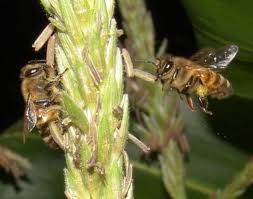“Battle of the Bees”: EU High Court rules on GMO Contamination; Opens Door to Biotech Liability
EU beekeepers gain in genetic contamination case.

In Sept. 2011, the European Union’s top court paved the way for farmers and beekeepers to recoup losses when their crops or honey become genetically contaminated from neighboring GM fields.
The European Court of Justice ruled that all food products containing GMOs – whether intentional or not – must undergo an approval process.
This marks a much stricter view than that being pushed by European Union Commissioner for health and consumer affairs, John Dalli, who wants no regulation of foods genetically contaminated “by accident,” a ludicrous idea given that coexistence ensures genetic contamination.
 At the center of the dispute is Bavarian beekeeper Karl Heinz Bablok who joined with several others in suing the state when its research plots of Monsanto’s GM corn, MON 810, contaminated his honey.
At the center of the dispute is Bavarian beekeeper Karl Heinz Bablok who joined with several others in suing the state when its research plots of Monsanto’s GM corn, MON 810, contaminated his honey.
In 2008, an administrative court banned Bablok from selling or giving away that honey. But in a bizarre turn, the Augsburg court also ruled that beekeepers have no claim to protection against the growing of GM crops. They immediately filed a new lawsuit. [1]
Discussing today’s ruling, attorneys for the beekeepers noted that they may now have “a claim for damages against a farmer if MON 810 pollen from his cultivation gets into their honey.” [2]
Attorneys Dr Achim Willand and Dr Georg Buchholz explained:
“If the beekeeper can no longer sell his honey, this is considered a major impairment causing a claim for damage. If the beekeeper moves his bees in order to prevent this impairment, it is also possible that the cultivator is liable for the additional work and expense of the beekeeper.”
They added that the “decision is important not only for beekeeping, but in general for the production of food and feed, as well as for trade.”
The new ruling will also apply to “imports containing traces of material from genetically modified crops that don’t have sufficient approval within the EU,” they said.
The European Court of Justice only “interprets EU law and does not settle the dispute itself,” notes Inf’OGM, a French group that maintains a neutral position on GMOs. Member states like Germany, France and Spain can apply the ruling however they deem fit in particular cases of genetic contamination. [3]
In describing the questions before the court, Inf’OGM explained that Monsanto failed to seek approval for genetically modified pollen. Instead, MON 810 approval only covers flour, gluten, semolina, starch, glucose and corn oil.
MON 810 approval is currently under reconsideration. It has been linked to organ damage in test animals [4] and its approval may be withdrawn. Until last year, it was the only GM crop approved for cultivation in the EU, although a total of 40 GMO food and feed products have been approved for sale. [5]
One of Commissioner Dalli’s first acts after taking office in 2010 was to lift the 13-year ban on BASF’s GM potato, Amflora. Sweden, Germany and the Czech Republic took the bait and immediately suffered from 47 contamination events. [6]
Today’s ruling also overturns the court’s Advocate General recommendation this February which found that genetic material inadvertently transferred from GM corn to other living organisms “is no longer viable and is thus infertile, is not a living organism and, therefore, cannot be regarded as a GMO.” [7]
In that same recommendation, however, the AG maintained that any products containing GMOs should be regulated.
Thijs Etty, a transnational environmental lawyer specializing in biotechnology and EU law, told Food Freedom, “The Court’s ruling underscores the EU’s zero-tolerance stance towards non-authorized GMOs, and signals a sensitive loss for Monsanto and the EU Commission.”
Etty explained that the EU Commission “has been working hard to loosen if not abandon the zero-tolerance policy,” citing a recent regulation “allowing ‘low level presence’ of non-authorized GMOs in feed imports.”
Today’s ruling puts that new regulation into question.
GMO opponents won a brief reprieve last year when Commissioner Dalli’s initial proposal to radically overhaul existing GM approval rules was later rebuked. The controversial proposal was dropped after the European Commission’s legal counsel determined the new rules violated EU and international trade laws. [8]
Of note, the European Food Safety Authority, which rules on GMO safety, has been under fire for hiring members with financial interests in the biotech industry. EFSA chair Diana Banati resigned last year after it was revealed she served as a consultant to biotech corporations including Monsanto, Bayer and BASF. [9]
Four other EFSA board members also have substantial ties to the food industry. One has financial interests in the GM seed industry (Piet Vanthemsche) and another is a chief lobbyist for the German food industry (Matthias Horst). Milan Kovác and Jirí Ruprich both have links to food industry bodies, EFSA admitted. [10]
“Today’s decision is an important victory for beekeepers, but also GMO-opponents and environmental NGOs,” concluded Etty.
But it’s not a complete victory. Though not as bad as in the U.S., GMO label laws still leave European consumers in the dark since meat, milk and eggs from animals fed GM feed are exempt, which bulldozes consumers into supporting the biotech industry.

